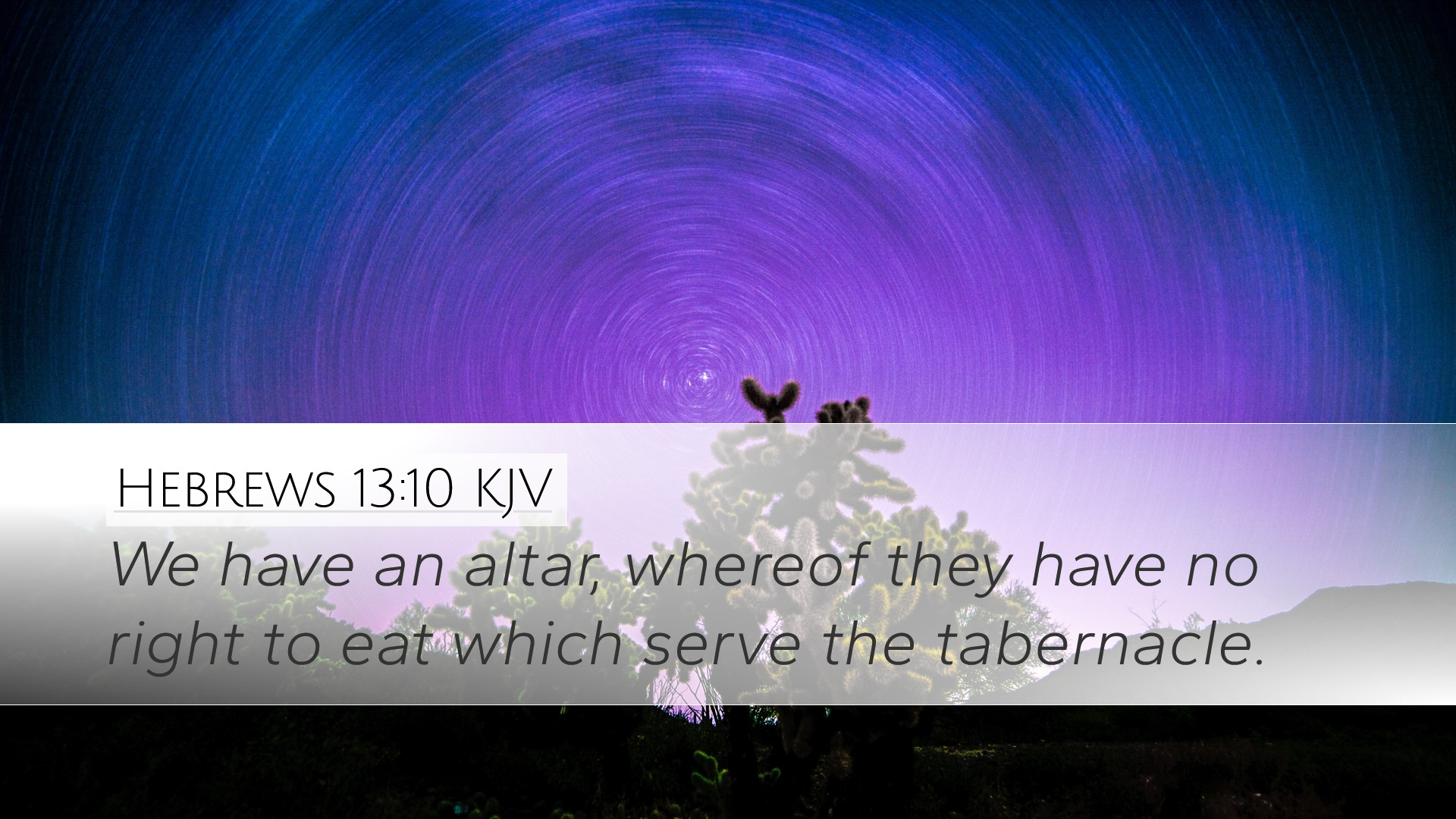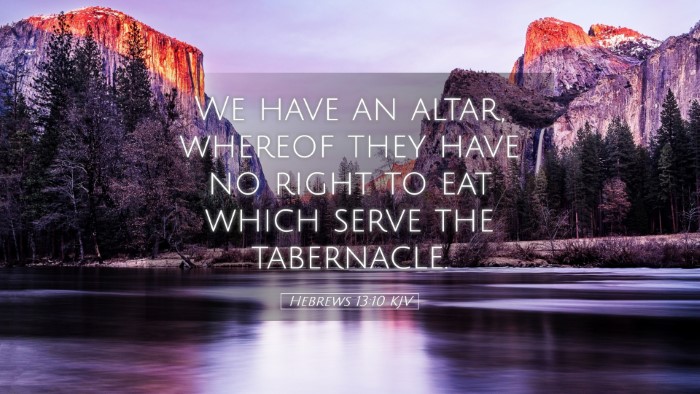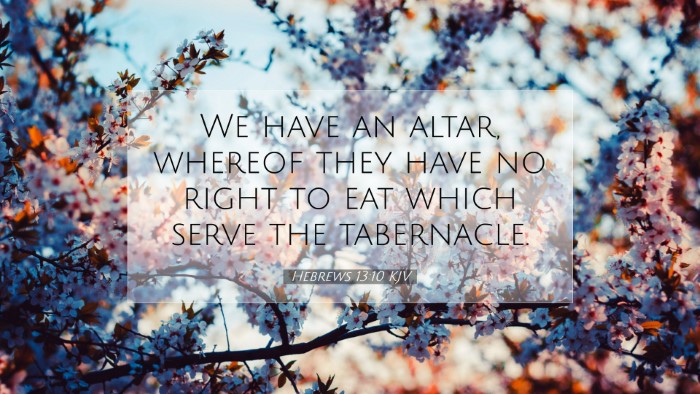Commentary on Hebrews 13:10
Hebrews 13:10 states: "We have an altar, whereof they have no right to eat which serve the tabernacle."
This verse encapsulates a profound theological declaration regarding the nature of the Christian altar and its exclusive access to believers, contrasting it with the sacrificial system of the Old Covenant. A detailed exploration of this verse draws from significant insights provided by esteemed public domain commentaries such as those of Matthew Henry, Albert Barnes, and Adam Clarke.
1. Context and Background
The Epistle to the Hebrews addresses Jewish Christians who are facing the temptation to return to traditional Judaism. The author emphasizes the superiority of Christ and the New Covenant over the Old Covenant. In this context, the reference to “an altar” suggests a rich theological implication, symbolizing the sacrifice of Christ and the associated covenantal privileges for believers.
2. Our Altar Defined
Matthew Henry distinguishes the Christian altar from that of the Jewish tabernacle. He notes that the "altar" mentioned here is Christ Himself as the ultimate sacrifice. Henry emphasizes that just as the Jewish altar was a place for offering sacrifices, the Christian's altar—Jesus—serves as the means through which believers find forgiveness and communion with God. It indicates that unlike the Levitical priests, believers have direct access to God through Christ, marked by grace rather than the law.
Albert Barnes adds to this perspective by discussing the significance of "eating" from the altar. He points out that the Levitical priests were entitled to partake of the sacrifices offered at the altar, yet those who adhere to the old order—the priests serving the tabernacle—are excluded from the spiritual blessings that come through Christ. This highlights the transformation wrought by Christ’s sacrifice, which now allows all believers—not just a select priestly class—access to God’s grace.
Adam Clarke further expands upon the implications of having an altar by stressing that the “Christians have an altar of a larger, nobler nature.” He argues that the sacrifices of the Old Covenant were intended to foreshadow what was ultimately fulfilled in Christ and that the New Covenant provides a more profound and effective means of atonement. Clarke's insights reinforce that the church, as the body of Christ, recognizes its identity as the living temple where spiritual sacrifices are made acceptable through Him.
3. The Contrast with the Tabernacle
The phrase “which serve the tabernacle” operates as a contrast to the Christian understanding of worship. Matthew Henry notes that those who serve the tabernacle are bound to the old religious system, which was limited and temporary. Their service represents the old covenant's inability to bring true fellowship with God. In contrast, believers have a superior altar and covenant that grants them life and spiritual nourishment through Christ's self-offering.
Albert Barnes emphasizes the exclusivity of access to this new altar. He states that the "they" refers to those still adhering to the old sacrificial practices, underscoring that their continued reliance on the Levitical system precludes them from the grace and sustenance offered by Christ. Thus, they fundamentally lack the right to partake, since they reject the very foundation of the true altar—Jesus Himself.
4. Theological Implications
As highlighted by Adam Clarke, the implications of Hebrews 13:10 extend to a broader understanding of one’s relationship with God. The verse asserts that participation in the benefits of Christ’s sacrifice is granted through faith. Clarke suggests that the non-participants, primarily referring to Jewish priests, reflect a vital lesson against reliance upon tradition and self-righteousness. For believers, the heart of worship is centered on Christ, making personal faith a prerequisite for communion with God.
This theological backdrop invites consideration of the nature of Christian worship today. With the understanding that Christ is the essence of the altar, believers are encouraged to partake in communion not just ritualistically but as a genuine expression of faith, acknowledging the deep grace obtained through Jesus' sacrifice.
5. Conclusion and Application
The message of Hebrews 13:10, supported by the insights of Henry, Barnes, and Clarke, beckons for profound reflection among pastors, theologians, and scholars. The recognition that Christians have a living altar in Christ serves as a constant reminder of the access granted to them for spiritual sustenance and community with God.
This verse challenges church leaders and congregants alike to view worship as an active engagement with the sacrificial love of Christ. It calls for a move away from ritualism and tradition toward a heartfelt approach to faith that honors the ultimate sacrifice—the divine altar, Jesus. In nurturing this awareness, not only is the essence of New Covenant worship solidified, but spiritual vitality is kindled among believers seeking communion with the Lord.
In conclusion, Hebrews 13:10 encapsulates the transformative power of Christ's atonement, urging believers to celebrate their unique position as participants in a covenant that goes beyond the limitations of the past. In Him, they find assurance, sustenance, and the right to partake in the heavenly blessings of an eternal relationship with God.


